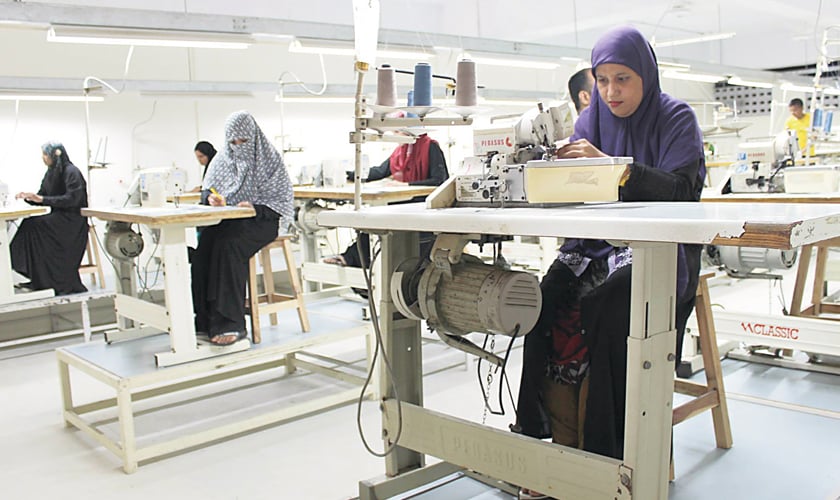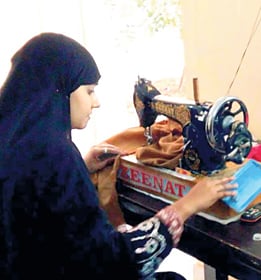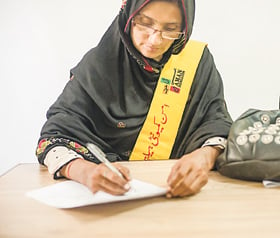For 17-year-old Iqra, getting out of the house everyday is a sign of independence. Iqra, who belongs to the lower stratum of society, is one of the millions of girls who are struggling constantly to break the vicious social circle.
For 17-year-old Iqra, getting out of the house everyday is a sign of independence. Iqra, who belongs to the lower stratum of society, is one of the millions of girls who are struggling constantly to break the vicious social circle. “In families like ours it is very difficult for us to go out and learn something productive which enable us to earn a decent living,” says Iqra, a resident of Korangi slum area, Karachi. “However, when I got an opportunity to join Aman Tech stitching programme, I easily got the permission by my parents owing to the Institute’s clean reputation. I am learning basic stitching here and after the completion of the course, I intend to find a job in a garment factory,” adds Iqra.

Iqra Almas is just one of the hundreds of students enrolled in Aman Tech Stitching Programme, a part of Aman Tech’s vocational training programmes, designed for young girls and boys from underprivileged backgrounds. The initiative was taken by Aman Foundation in 2011 in a bid to transform the underserved, unemployed and untrained youth into productive members of the society by teaching them both vocational and soft skills. Spread over a vast area of 6 acres in Karachi’s Korangi Industrial Area, Aman Foundation is a modern facility comprising 23 classrooms, 22 workshops, 13 fully equipped computer labs, an extensive library, a sports ground and a students’ recreational area. They train students in 15 different trades ranging from Automobile to Carpentry, making them market ready in 6-12 months. The graduates are awarded certificates upon completion by either expert organisations like City & Guilds, UK and Sindh Board of Technical Education (SBTE), or Aman Tech itself.
“This is the first time that I have come out of my house to learn some skill,” unfolds 18-year-old Khajista. “I live in Korangi. My father is a labour. I did not go to school because my father could not afford my education. However, I wanted to do something to stand on my own feet. I was naturally good at stitching, so I was more than happy when I got the chance to polish my skills at Aman Tech stitching programme. Interacting with other girls has also has given me a lot of confidence. Everyone is so friendly here,” shares Khajista.
 While explaining the mechanism of the said course, Ms. Nusrat, one of the teachers at the Aman Tech Stitching Programme tells, “Started in 2015, The Stitching Machinist course, in collaboration with USAID and Yunus Textile Mills (YTM), is AmanTech’s first female driven course. The stitching machinist course pertains to home textile stitching. During the three month duration, students are taught stitching of items like bed sheets, pillow covers, curtain and duvet/quilt covers along with the theory of stitching, safety and basic mathematical calculations.”
While explaining the mechanism of the said course, Ms. Nusrat, one of the teachers at the Aman Tech Stitching Programme tells, “Started in 2015, The Stitching Machinist course, in collaboration with USAID and Yunus Textile Mills (YTM), is AmanTech’s first female driven course. The stitching machinist course pertains to home textile stitching. During the three month duration, students are taught stitching of items like bed sheets, pillow covers, curtain and duvet/quilt covers along with the theory of stitching, safety and basic mathematical calculations.”
“These girls are very talented and they take keen interest in learning the skills. Girls usually come from conservative families but since we are a credible institute parents allow their daughters to come here. We even provide them transportation. In fact I have noticed that girls who are not educated show more zeal than those who are slightly educated. They are quick learners and are driven with passion to show it to the world that they are not less than anyone,” observes Ms. Nusrat.
According to 16-year-old Nimra, joining Aman Tech Stitching Programme has given her a sense of direction. “I studied till 8th grade and then I was home as my circumstances did not allow me to study further. I was very disheartened but then someone told me about this stitching programme where I could learn the craft and earn eventually. It has been a wonderful experience; teachers are very cooperative here. Thanks Aman Tech for giving girls like me a path towards better future,” sums up Nimra.
Spreading awareness...
Being the sixth largest country in the world with a population of 194 million, it is estimated that Pakistan could become the fifth largest country by the year 2050. Even though there is considerable demand for family planning in Pakistan, the adoption of family planning has been hampered by government neglect, lack of services and misconceptions.
Pakistan plans to achieve universal access to reproductive health by 2020, and to raise the use of contraception to 55 per cent by then. With an aggressive family planning programme, Pakistan can bring down the fertility rate. Yet, when it comes to contraceptive use, it remains at a lower side. The situation is more alarming in slum areas of Karachi. Keeping that in mind Aman Foundation started its vigorous family planning programme, called ‘Sukh’, in 2014 in collaboration with the local government in targeted areas of Karachi. 
“Keeping with its vision of a vibrant and healthy Karachi, the Aman Foundation has created a three-pronged healthcare eco-system in the form of Aman Health Care Services (AHCS). With a focus on mother & child health, our community health program, which includes a family planning and maternal health program called ‘Sukh’, covers a population of over 1.1 million,” explains Dr. Kanwal Khoja, who is associated with Aman community Health Programme.
“Thousands of women in our country are not aware of contraceptive methods, the result is unwanted pregnancies. The goal of Sukh Initiative is to increase modern contraceptive usage by 15 percentage points in selected, underserved, 1 million peri-urban communities from 4 towns of Karachi, namely Bin Qasim, Korangi, Landhi & Malir. The focus lies on young, newly wedded and low-parity (1 to 2 children) couples. In the context to Pakistan, this will translate in improving maternal and neonatal health by reducing unintended pregnancies,” elaborates Dr. Khoja.
While talking about the modus operandi Dr. Khoja says, “Sukh aims to inform and bring awareness to the local communities about family planning and contraceptives. We work in close association with Agha Khan, Jhpiego, and DKT. Both Jhpiego and DKT are international organizations - offering a range of modern family planning services in the developing world. Under our Sukh project Agha Khan, DKT and Jhpiego, funded by the U.S. Agency for International Development (USAID) are rendering their valuable services to us.”
“We spread awareness through our community health workers who go door-to-door for counselling in targeted areas. The community health workers also provide follow-up services for worrisome cases. If someone needs medical care, they refer them to our subscribed clinics where women can be treated. We choose workers from the same communities train them and send them back to their respective communities with a committed agenda to persuade women towards adopting family planning measures,” she elucidates.
This scribe talks to Sanam, one of the Aman Foundation’s Community Health Workers (CHW), who shares her experience with us, “I live in Malir and have been working since two years. I was thoroughly trained by my supervisors. My timings are from 9am to 5pm. My designated area is Malir, since I am familiar with the area, it’s easy for me to communicate openly with the inhabitants.”
“However, this job by no means is an easy one, going from door to door and facing all kind of reactions demands a lot of patience and persistence. You have to have great PR skills to talk to complete strangers. Sometimes we get warm welcomes and sometimes we meet with cold attitudes and humiliation,” adds Sanam.
“What I like best about my job is that I have this satisfactory feeling that I am doing something productive. Even if I succeed in convincing two women out of 10 to start taking precautions, my job is done. If we all put in a little effort in whatever way we can, I am sure we can put a stop to a looming bomb on our heads called ‘population’,” says a committed Sanam with a smile.